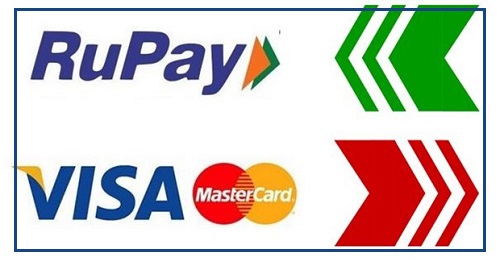Debit and credit cards play a crucial role in facilitating transactions for individuals, with banks issuing different types of cards.
While banks issue both RuPay and Visa cards, it’s essential to understand the differences between them and determine which card suits your requirements.
Let’s explore the variances between RuPay and Visa cards and why banks offer distinct options.
RuPay Card
RuPay cards are domestically created payment systems facilitated by the National Payments Corporation of India (NPCI).
Designed as an indigenous alternative to global payment networks like Visa and Mastercard, RuPay cards are widely accepted across India by ATMs, point-of-sale (POS) terminals, and online retailers.
These cards offer several advantages, including lower transaction costs and enhanced security features. The name “RuPay” derives from the Hindi word for the national currency of India, the rupee.
Visa Card
Visa cards are payment cards linked to bank or savings accounts, enabling users to make purchases and withdraw cash from ATMs. Financial institutions participating in the Visa Payments Network issue these cards.
Transactions made with Visa debit cards are processed through the Visa payments network, with the purchase amount debited from the connected account.
Visa cards provide the convenience of cashless transactions without the need for physical currency and are accepted at millions of businesses and ATMs worldwide.
Many Visa cards also offer additional features such as rewards programs and fraud prevention measures.
Key Differences Between Visa and RuPay Debit Cards
Processing Fee: RuPay debit cards have lower processing fees compared to Visa debit cards, as Visa is associated with foreign card networks.
Transaction Speed: RuPay debit card transactions are processed locally, resulting in potentially faster transaction times compared to Visa debit cards.
However, the difference in speed is typically minimal, lasting only a few seconds.
Global Acceptance: One significant drawback of RuPay debit cards is their limited acceptance through domestic payment gateways, making international transactions less feasible.
Visa debit cards, on the other hand, allow customers to transact both domestically and internationally.
Fees: Indian banks do not incur entry fees or quarterly fees for RuPay debit cards, whereas fees are associated with Visa debit cards.
Card Type: RuPay card associates solely offer debit card options, while Visa provides both debit and credit card options.
Security: Both RuPay and Visa cards offer equally robust transaction security measures, ensuring safe and secure transactions.
Consider your specific requirements, transaction preferences, and international usage needs when choosing between RuPay and Visa debit cards.
Understanding these differences will help you make an informed decision and select the card that best aligns with your financial priorities.
